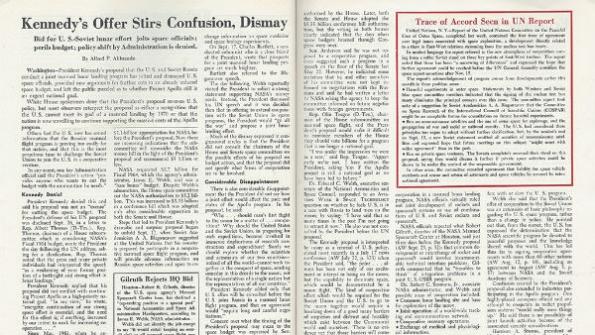The U.S.-Russian Moon Landing That Never Happened (1963)

U.S. President John F. Kennedy is well known for the 1961 speech to Congress in which he made the Apollo program a national goal. Less remembered is his controversial offer two years later to cooperate with the Soviet Union on a manned lunar landing.
In September 1963 – less than a year after the Cuban Missile Crisis and two months before he would be assassinated in Dallas – Kennedy extended his proposal to Moscow during a speech at the United Nations. The offer created a firestorm in the U.S., with critics charging that it could torpedo the pricey Apollo program.
“White House spokesmen deny that the president’s proposal reverses U.S. policy, but most observers interpret the proposal as either a recognition that the U.S. cannot meet its goal of a manned landing by 1970 or that the nation is now unwilling to continue supporting the massive costs of the Apollo program,” Aviation Week’s Alfred P. Alibrando wrote in our Sept. 30, 1963 edition. He added, “One highly placed aerospace official said any attempt to cooperate in rocket propulsion systems ‘ would really mess things up.’ He said there is no possibility of joint launch activities because of the associated security considerations.”
Aviation Week’s conservative editor-in-chief, Robert Hotz, weighed in with a signed editorial titled “Kennedy’s Space Boomerang.” Calling the UN speech an “extraordinary feat of political contortion,” Hotz warned that it “ represented a basic shift in U.S. space policy that is losing political support for the program and braking much of the technical momentum already achieved... The Soviet contributions to international space technology gatherings in recent years have been vapid and inconsequential compared with the data they have obviously garnered.”
Alas, the U.S. did achieve Kennedy’s goal of landing men on the moon before the end of the 1960s, without Soviet cooperation. The two nations would conduct a joint docking in space with Apollo-Soyuz in 1975 – a cooperative effort that was also met with a scathingly critical Hotz editorial.
Today, U.S. and Russian relations are at a modern low point, thanks to Russian President Vladimir Putin’s destabilizing campaigns in Ukraine. But the two nations continue to cooperate on the International Space Station, with the U.S. relying on Russian vehicles to ferry astronauts to the orbital outpost. I wonder what Hotz would think about that.

